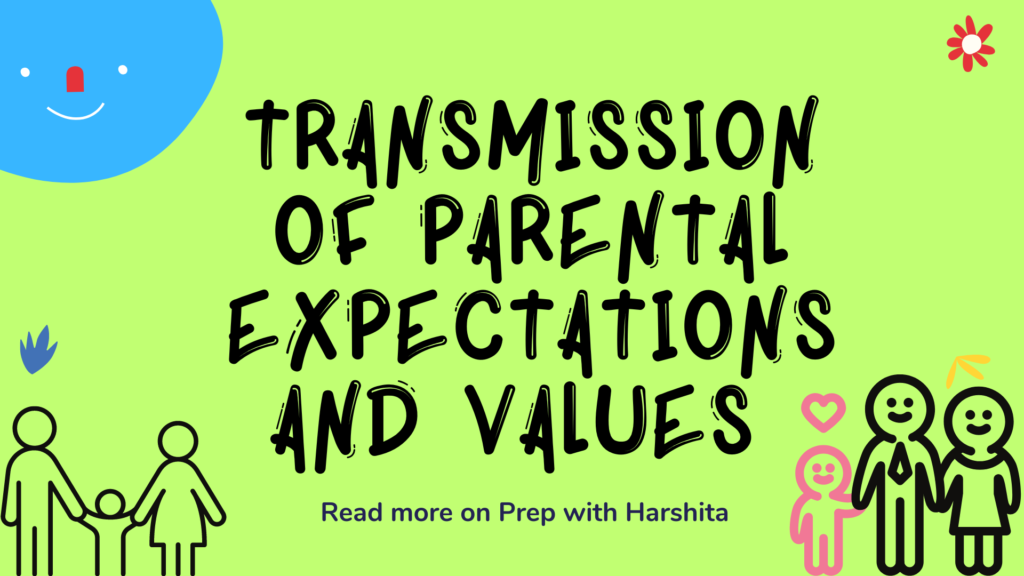The transmission of parental expectations and values refers to the process by which parents pass on their beliefs, values, and expectations to their children. This transmission can occur through various means, including direct communication, modeling, and socialization.
Here are some key points to consider regarding the transmission of parental expectations and values:
- Direct Communication: Parents convey their expectations and values through explicit verbal communication. They may have conversations with their children about their beliefs, principles, and desired behaviors. For example, parents might discuss the importance of honesty, respect, or academic achievement. They may set clear expectations regarding responsibilities, chores, or goals, and explain the rationale behind them.
- Implicit Communication and Modeling: Parents transmit expectations and values through their own behavior and actions. Children observe and internalize how their parents navigate daily life, handle challenges, and interact with others. Parents serve as role models, and their behavior can shape children’s understanding of what is considered acceptable or desirable. For instance, if parents consistently demonstrate kindness and empathy, children are more likely to value and emulate these qualities.
- Family Rituals and Traditions: Family rituals, traditions, and celebrations provide opportunities to transmit values and expectations. These shared activities often embody certain values or beliefs. For example, a family tradition of volunteering together can communicate the value of community service, while religious ceremonies can convey religious beliefs and practices. These rituals create a sense of identity and reinforce values within the family unit.
- Reinforcement and Feedback: Parents reinforce their expectations and values through feedback, rewards, and consequences. Positive reinforcement, such as praise, encouragement, or small rewards, can motivate children to exhibit desired behaviors and adopt specific values. Conversely, when children deviate from expectations or violate values, parents may provide corrective feedback, withdraw privileges, or apply appropriate consequences to discourage such behavior.
- Media and Cultural Influences: Parents are not the sole influencers of their children’s values and expectations. Media, including television, movies, music, and the internet, play a significant role in shaping children’s perceptions and beliefs. Cultural and societal norms also influence parental expectations. Parents navigate the challenge of reconciling their own values with the broader cultural influences and media messages that their children encounter.
- Parental Involvement and Support: The level of parental involvement and support in children’s lives impacts the transmission of expectations and values. Engaged parents who maintain open lines of communication, actively participate in their children’s activities, and provide guidance tend to have a greater influence on shaping their children’s values and expectations. Establishing a warm and supportive parent-child relationship fosters trust and facilitates the transmission process.
- Parental Consistency: Consistency in parental messaging is crucial for effective transmission. When parents have consistent expectations and values across various contexts and situations, children develop a clear understanding of what is expected of them. Inconsistent messaging or conflicting expectations can confuse children and hinder the internalization of desired values.
- Developmental Considerations: Children’s capacity to comprehend and internalize parental expectations and values evolves with age and cognitive development. Parents should adapt their communication and level of detail to suit their child’s age and maturity. As children grow older, they may engage in discussions, question values, and develop their own perspectives. Parents should encourage critical thinking and open dialogue while respecting their child’s emerging autonomy.
It’s important to recognize that children are not passive recipients of parental expectations and values. They actively interpret, negotiate, and sometimes challenge these influences as they develop their own identities and value systems. Parental transmission of expectations and values should promote independent thinking, self-reflection, and the development of a moral compass that aligns with their child’s evolving sense of self.
Also Read : Mutual Dependence of Man and Society

Also Visit : Prep with Harshita


Thanks for providing very good and understanding insight of the much required topic.